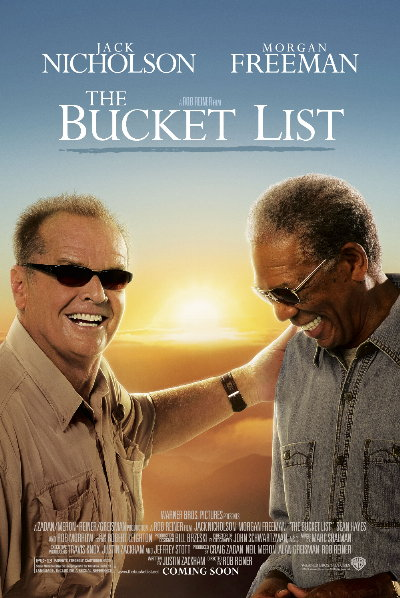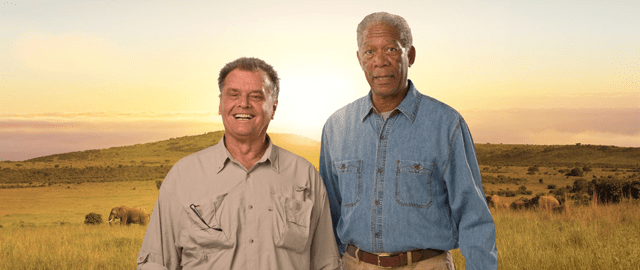
May 11, 2012
This article was originally posted on Positive Psychology News Daily in November 2007
Imagine this: A corporate billionaire and a working class mechanic have nothing in common until they share a hospital room and realize that they both share a burning desire to spend the time that they do have left to accomplish unfulfilled dreams until they “kick the bucket.” Together they embark on the road trip of a lifetime, becoming friends along the way and learning to live life to the fullest. Each goal accomplishment is another check off the list, and they find that this adventure is what defines them as human beings and gives them the joy that had been hitherto elusive.
Yes, this is a movie, and a probable Hollywood blockbuster at that, but it’s not too far off the mark from what I am privileged to see and participate in every single day as a performance coach who works to help people identify their goals and then go after them. “The Bucket List” will open on Christmas Day with Jack Nicholson and Morgan Freeman in the title roles, and I predict that the worlds of coaching and Positive Psychology will experience an upsurge as a result as people realize how much joy can come from making a life list and going after those goals now, instead of waiting for “the right time.”
Although “The Bucket List” is fictional, there are some famous stories of “life lists” that were actually inspired by close brushes with death. Phil Keoghan, the host of the television show, “The Amazing Race,” had a close call while scuba diving and decided that he had to go after his dreams as a result, which also gave birth to a book about the topic called, “No Opportunity Wasted.”
 Ted LeonsisThe same is true of Ted Leonsis, the owner of the Washington Capitals and one of the geniuses at America Online. This billionaire grabbed some paper while an airplane flight was experiencing severe turbulence, and he wrote down all of the things he’d do if he were permitted to live. He lived, and he uses his “life list” as a tool to teach others about how to set and achieve goals, using a life list as the roadmap for a fulfilling life. He maintains a public list, checking off goals as he gets them done.
Ted LeonsisThe same is true of Ted Leonsis, the owner of the Washington Capitals and one of the geniuses at America Online. This billionaire grabbed some paper while an airplane flight was experiencing severe turbulence, and he wrote down all of the things he’d do if he were permitted to live. He lived, and he uses his “life list” as a tool to teach others about how to set and achieve goals, using a life list as the roadmap for a fulfilling life. He maintains a public list, checking off goals as he gets them done.
Oprah Winfrey once featured a woman on her show who had done a routine skydive, only to have her chute fail to open. As she hurtled towards her almost-certain death, the woman said she was surprised that she didn’t see her life flash before her eyes or meet her dead relatives who were going to escort her to the afterlife. Instead, she experienced flashes of regret as she reviewed all of the goals she’d had in her life that she’d never pursued, either out of fear or embarrassment.
This woman hit the ground at 80 miles per hour and broke almost every bone in her body. But she rehabbed diligently and then married her skydiving instructor. She also created a list of all of the goals she’d seen in the sky, and she is now on a mission to accomplish them, one at a time.
Recently, I saw an article in “The Washington Post” about a father whose son perished in one of the World Trade Center towers on 9/11. His life was not only turned upside-down with grief, he was seized with the certainty that he had to go after all of his own goals before it was too late, because his son hadn’t had the chance to go after his. Again, what we see here is an example of how brushes with death can galvanize us, or someone close to us, to seize the day and play bigger in life.

The reason why I’m a performance coach is partly because of my own father and the main goal he set for himself, but never went after. My entire life, I heard my brainy, well-educated father discuss his enthusiasm for retracing Odysseus’ voyage around the Greek Islands. Books often dotted our dining room table about this epic voyage, and I just assumed that this would be the first thing my father would do as we all departed for college and started our adult lives.Odysseus’ voyage around Greek Islands.


That wasn’t to be. My father died at the age of 69 from the terrible and fast-moving ravages of Shy-Drager, which reduced him from a fit workaholic to an ancient man in a wheelchair in a matter of months. When my family gathered at the hospital the night he died, the only thought we all had was that he’d never gone after his Homeric dream. As I gazed at my father’s lifeless body, all I could ask myself helplessly was, “Why didn’t you do it, Dad?” That thought, more than anything, made me sad and determined to never have my own children wonder why I hadn’t done the things that would bring me joy while I was alive and able to do them.

Dr. Laura King of the University of Missouri won the Templeton Prize for her contributions to Positive Psychology, and much of her research has focused on the power of goals to create and sustain well-being. In a recent interview I conducted with her, Dr. King noted her continuing surprise that people don’t always set goals given their importance. In our interview, she stressed the importance of bidding farewell to our “Lost Possible Selves” — or the people we once thought we’d be — in order to engage in life in a fresh way with more relevant goals. Dr. King believes that writing down our goals even once, possibly in a life list, can have the result of giving us more hope, less goal conflict, and more engagement in life.
Last week I gave a speech in Myrtle Beach, South Carolina to several hundred people about “Making Your Life List Happen.” It seemed like no one moved or breathed as I spoke about the importance of goals, and the scientific evidence backing different approaches to goal accomplishment. Wherever I go, this is exactly what I see – people are exhilarated by the topic, but don’t always trust the process or know where to start. After I finished, people lined up to share their goals with me and other strangers, and then buttonholed me in elevators and hallways to ask me what I thought of their goals to start a business, go back to school, help injured wildlife, and more. It was empowering to see the sparks light up in their lives as they gave themselves permission to dream and do in a different way.

The most poignant thing I’ve ever witnessed about the power of goal-setting was Randy Pausch’s last lecture at Carnegie-Mellon in September. Riddled with pancreatic cancer, this young and charismatic professor is leaving behind three small children and a wife, and has been given just a few months to live. Instead of bemoaning his fate, Pausch used his last lecture (which has had over 1 million website hits since being posted) to extoll the virtues of living with a passion, including having childhood dreams that you pursue. To see Pausch’s lecture or to purchase it for a small fee, visit Pausch’s website.
If you’d like to get started on creating your own life list, please visit any of the popular sites that show you how to start. At my own website, you can download forms that help you group your goals into sets of ten. www.43things.com and www.superviva.com also give you fresh tools to dream, dare and do.
Whatever else you plan for your holidays, please take the time to go to a movie theater to share in the uplifting story of “The Bucket List.” I was privileged to be interviewed on National Public Radio with the movie’s producer in September, and I know that this movie has the power to change your life and your well-being, if you are open and daring and willing to go outside your comfort zone.
 Even the Dalai Lama, in his 19 “instructions for life,” seems to bless the idea behind “The Dalai LamaBucket List” and having life lists that involve taking action and taking risks. His first instruction is: “Take into account that great love and great achievements involve great risk.” Number 16 is: “Once a year, go some place you’ve never been before.”
Even the Dalai Lama, in his 19 “instructions for life,” seems to bless the idea behind “The Dalai LamaBucket List” and having life lists that involve taking action and taking risks. His first instruction is: “Take into account that great love and great achievements involve great risk.” Number 16 is: “Once a year, go some place you’ve never been before.”
So get going and make 2008 the year you mark as the beginning of a great adventure!
(Special thanks to Olivia McDonald in England, who sent along the Dalai Lama’s “Instructions for Life” while I was on deadline, smartly pointing out that if I visit her in Winchester in 2008, I will be going outside my comfort zone and holding true to the Dalai Lama’s guidance.)





This blog is really outdated but not in terms of the message…I was able to watch the movie and have had my own “Bucket List” since then…follow the advice and strive to live a fuller and happier life!